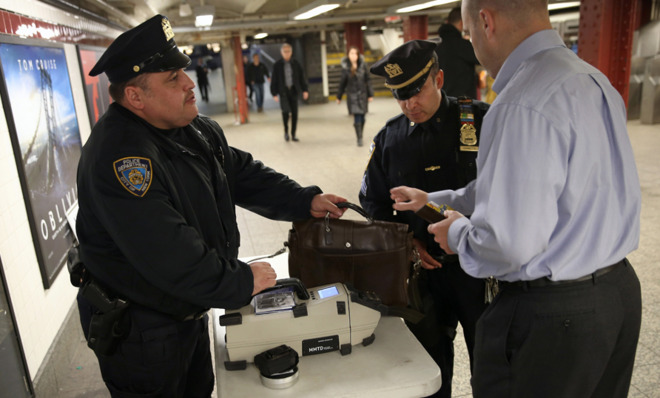Do Americans really prioritize security over freedom?
CNN's Jake Tapper says yes. The evidence says no.

A free daily email with the biggest news stories of the day – and the best features from TheWeek.com
You are now subscribed
Your newsletter sign-up was successful
Jake Tapper of CNN raised eyebrows recently by claiming that "the American people, honestly, want security over freedom."
That would seem to be a big departure from the ideals of, say, Benjamin Franklin, who wrote that "those who would give up essential Liberty, to purchase a little temporary Safety, deserve neither Liberty nor Safety."
And is Tapper's claim even true? Do the American people prioritize security over freedom? The most recent evidence doesn't support Tapper's claim.
The Week
Escape your echo chamber. Get the facts behind the news, plus analysis from multiple perspectives.

Sign up for The Week's Free Newsletters
From our morning news briefing to a weekly Good News Newsletter, get the best of The Week delivered directly to your inbox.
From our morning news briefing to a weekly Good News Newsletter, get the best of The Week delivered directly to your inbox.
Since the 9/11 attacks, Gallup has periodically conducted polls on the question of whether or not the government should violate civil liberties in order to take steps to prevent terrorism.
In the most recent poll, in August 2011, 71 percent of respondents said that they thought the government should only take steps that do not violate civil liberties, while just 25 percent thought the government should take any steps necessary, even if that means violating civil liberties.
Even in January 2002, just a few months after the 9/11 attacks, only 49 percent of Americans thought the government should take any steps necessary. But over the last decade, every time Gallup has asked the question, a majority have chosen protecting civil liberties over enhanced security.
Other polls have shown similar results.
A free daily email with the biggest news stories of the day – and the best features from TheWeek.com
A Pew poll in August of this year found that 47 percent thought the government had gone too far in restricting civil liberties compared to 35 percent who thought the government had not gone far enough to protect the country. In 2010, 58 percent thought the government had not gone far enough, with just 27 percent saying it had gone too far.
And a Quinnipiac poll in July of this year found that 45 percent thought the government had gone too far in restricting civil liberties, compared to 40 percent who thought the government had not gone far enough to protect the country. This was a major shift from 2010, when Quinnipiac asked the same question and found that 25 percent thought the government had gone too far, while 63 thought it had not gone far enough.
The most recent polls which, remember, came during a rash of revelations about invasive NSA domestic spying practices, point to the fact that Americans are getting less hawkish about national security, and want more freedom, not more security measures.
John Aziz is the economics and business correspondent at TheWeek.com. He is also an associate editor at Pieria.co.uk. Previously his work has appeared on Business Insider, Zero Hedge, and Noahpinion.
-
 Political cartoons for February 15
Political cartoons for February 15Cartoons Sunday's political cartoons include political ventriloquism, Europe in the middle, and more
-
 The broken water companies failing England and Wales
The broken water companies failing England and WalesExplainer With rising bills, deteriorating river health and a lack of investment, regulators face an uphill battle to stabilise the industry
-
 A thrilling foodie city in northern Japan
A thrilling foodie city in northern JapanThe Week Recommends The food scene here is ‘unspoilt’ and ‘fun’
-
 The billionaires’ wealth tax: a catastrophe for California?
The billionaires’ wealth tax: a catastrophe for California?Talking Point Peter Thiel and Larry Page preparing to change state residency
-
 Bari Weiss’ ‘60 Minutes’ scandal is about more than one report
Bari Weiss’ ‘60 Minutes’ scandal is about more than one reportIN THE SPOTLIGHT By blocking an approved segment on a controversial prison holding US deportees in El Salvador, the editor-in-chief of CBS News has become the main story
-
 Has Zohran Mamdani shown the Democrats how to win again?
Has Zohran Mamdani shown the Democrats how to win again?Today’s Big Question New York City mayoral election touted as victory for left-wing populists but moderate centrist wins elsewhere present more complex path for Democratic Party
-
 Millions turn out for anti-Trump ‘No Kings’ rallies
Millions turn out for anti-Trump ‘No Kings’ ralliesSpeed Read An estimated 7 million people participated, 2 million more than at the first ‘No Kings’ protest in June
-
 Ghislaine Maxwell: angling for a Trump pardon
Ghislaine Maxwell: angling for a Trump pardonTalking Point Convicted sex trafficker's testimony could shed new light on president's links to Jeffrey Epstein
-
 The last words and final moments of 40 presidents
The last words and final moments of 40 presidentsThe Explainer Some are eloquent quotes worthy of the holders of the highest office in the nation, and others... aren't
-
 The JFK files: the truth at last?
The JFK files: the truth at last?In The Spotlight More than 64,000 previously classified documents relating the 1963 assassination of John F. Kennedy have been released by the Trump administration
-
 'Seriously, not literally': how should the world take Donald Trump?
'Seriously, not literally': how should the world take Donald Trump?Today's big question White House rhetoric and reality look likely to become increasingly blurred